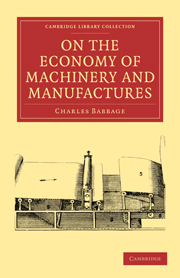Book contents
- Frontmatter
- PREFACE
- Contents
- INTRODUCTION: STATEMENT OF THE OBJECT AND PLAN OF THE WORK
- CHAPTER I SOURCES OF THE ADVANTAGES ARISING FROM MACHINERY AND MANUFACTURES
- CHAPTER II ACCUMULATING POWER
- CHAPTER III REGULATING POWER
- CHAPTER IV INCREASE AND DIMINUTION OF VELOCITY
- CHAPTER V EXTENDING TIME OF ACTION OF FORCES
- CHAPTER VI SAVING TIME IN NATURAL OPERATIONS
- CHAPTER VII EXERTING FORCES TOO GREAT FOR HUMAN POWER, AND EXECUTING OPERATIONS TOO DELICATE FOR HUMAN TOUCH
- CHAPTER VIII REGISTERING OPERATIONS
- CHAPTER IX ECONOMY OF MATERIALS EMPLOYED
- CHAPTER X OF THE IDENTITY OF THE WORK WHEN IT IS OF THE SAME KIND, AND OF ITS ACCURACY WHEN OF DIFFERENT KINDS
- CHAPTER XI OF COPYING
- CHAPTER XII ON THE METHOD OF OBSERVING MANUFACTORIES
- CHAPTER XIII ON THE DIFFERENCE BETWEEN MAKING AND MANUFACTURING
- CHAPTER XIV ON THE INFLUENCE OF VERIFICATION ON PRICE
- CHAPTER XV ON THE INFLUENCE OF DURABILITY ON PRICE
- CHAPTER XVI ON PRICE, AS MEASURED BY MONEY
- CHAPTER XVII OF RAW MATERIALS
- CHAPTER XVIII OF THE DIVISION OF LABOUR
- CHAPTER XIX ON THE DIVISION OF MENTAL LABOUR
- CHAPTER XX ON THE SEPARATE COST OF EACH PROCESS IN A MANUFACTURE
- CHAPTER XXI ON THE CAUSES AND CONSEQUENCES OF LARGE FACTORIES
- CHAPTER XXII ON THE POSITION OF GREAT FACTORIES
- CHAPTER XXIII ON OVER-MANUFACTURING
- CHAPTER XXIV INQUIRIES PREVIOUS TO COMMENCING ANY MANUFACTORY
- CHAPTER XXV ON CONTRIVING MACHINERY
- CHAPTER XXVI PROPER CIRCUMSTANCES FOR THE APPLICATION OF MACHINERY
- CHAPTER XXVII ON THE DURATION OF MACHINERY
- CHAPTER XXVIII ON COMBINATION AMONGST MASTERS OR WORKMEN AGAINST EACH OTHER
- CHAPTER XXIX ON COMBINATIONS OF MASTERS AGAINST THE PUBLIC
- CHAPTER XXX ON THE EFFECT OF TAXES AND OF LOCAL RESTRICTIONS UPON MANUFACTURES
- CHAPTER XXXI ON THE EXPORTATION OF MACHINERY
- CHAPTER XXXII ON THE FUTURE PROSPECTS OF MANUFACTURES, AS CONNECTED WITH SCIENCE
CHAPTER XXIV - INQUIRIES PREVIOUS TO COMMENCING ANY MANUFACTORY
Published online by Cambridge University Press: 29 August 2010
- Frontmatter
- PREFACE
- Contents
- INTRODUCTION: STATEMENT OF THE OBJECT AND PLAN OF THE WORK
- CHAPTER I SOURCES OF THE ADVANTAGES ARISING FROM MACHINERY AND MANUFACTURES
- CHAPTER II ACCUMULATING POWER
- CHAPTER III REGULATING POWER
- CHAPTER IV INCREASE AND DIMINUTION OF VELOCITY
- CHAPTER V EXTENDING TIME OF ACTION OF FORCES
- CHAPTER VI SAVING TIME IN NATURAL OPERATIONS
- CHAPTER VII EXERTING FORCES TOO GREAT FOR HUMAN POWER, AND EXECUTING OPERATIONS TOO DELICATE FOR HUMAN TOUCH
- CHAPTER VIII REGISTERING OPERATIONS
- CHAPTER IX ECONOMY OF MATERIALS EMPLOYED
- CHAPTER X OF THE IDENTITY OF THE WORK WHEN IT IS OF THE SAME KIND, AND OF ITS ACCURACY WHEN OF DIFFERENT KINDS
- CHAPTER XI OF COPYING
- CHAPTER XII ON THE METHOD OF OBSERVING MANUFACTORIES
- CHAPTER XIII ON THE DIFFERENCE BETWEEN MAKING AND MANUFACTURING
- CHAPTER XIV ON THE INFLUENCE OF VERIFICATION ON PRICE
- CHAPTER XV ON THE INFLUENCE OF DURABILITY ON PRICE
- CHAPTER XVI ON PRICE, AS MEASURED BY MONEY
- CHAPTER XVII OF RAW MATERIALS
- CHAPTER XVIII OF THE DIVISION OF LABOUR
- CHAPTER XIX ON THE DIVISION OF MENTAL LABOUR
- CHAPTER XX ON THE SEPARATE COST OF EACH PROCESS IN A MANUFACTURE
- CHAPTER XXI ON THE CAUSES AND CONSEQUENCES OF LARGE FACTORIES
- CHAPTER XXII ON THE POSITION OF GREAT FACTORIES
- CHAPTER XXIII ON OVER-MANUFACTURING
- CHAPTER XXIV INQUIRIES PREVIOUS TO COMMENCING ANY MANUFACTORY
- CHAPTER XXV ON CONTRIVING MACHINERY
- CHAPTER XXVI PROPER CIRCUMSTANCES FOR THE APPLICATION OF MACHINERY
- CHAPTER XXVII ON THE DURATION OF MACHINERY
- CHAPTER XXVIII ON COMBINATION AMONGST MASTERS OR WORKMEN AGAINST EACH OTHER
- CHAPTER XXIX ON COMBINATIONS OF MASTERS AGAINST THE PUBLIC
- CHAPTER XXX ON THE EFFECT OF TAXES AND OF LOCAL RESTRICTIONS UPON MANUFACTURES
- CHAPTER XXXI ON THE EXPORTATION OF MACHINERY
- CHAPTER XXXII ON THE FUTURE PROSPECTS OF MANUFACTURES, AS CONNECTED WITH SCIENCE
Summary
(233.) There are many inquiries which ought always to be made previous to the commencement of the manufacture of any new article. These chiefly relate to the expense of tools, machinery, raw materials, and all the outgoings necessary for its production,—to the extent of the demand which is likely to arise,—to the time in which the circulating capital will be replaced,—and to the quickness or slowness with which the new article will supersede those already in use.
(234.) The expense of tools and of new machines will be more difficult to ascertain, in proportion as they differ from those already employed; but the variety in constant use, in our various manufactories, is such, that few inventions now occur in which some considerable portion may not be found resembling others already constructed. The cost of the raw material is usually less difficult to determine; but there occasionally arise cases in which it becomes important to examine whether the supply, at the given price, can be depended upon: for, in the case of a small consumption, the additional demand arising from a factory may produce a considerable temporary rise in price; although the same circumstance may ultimately reduce its price.
(235.) The quantity of any new article likely to be consumed is a most important subject for the consideration of the projector of a new manufacture. As these pages are not intended for the instruction of the manufacturer, but rather for the purpose of giving a general view of the subject, an illustration of the way in which such questions are regarded by practical men, will, perhaps, be most instructive.
- Type
- Chapter
- Information
- On the Economy of Machinery and Manufactures , pp. 198 - 205Publisher: Cambridge University PressPrint publication year: 2010First published in: 1832



